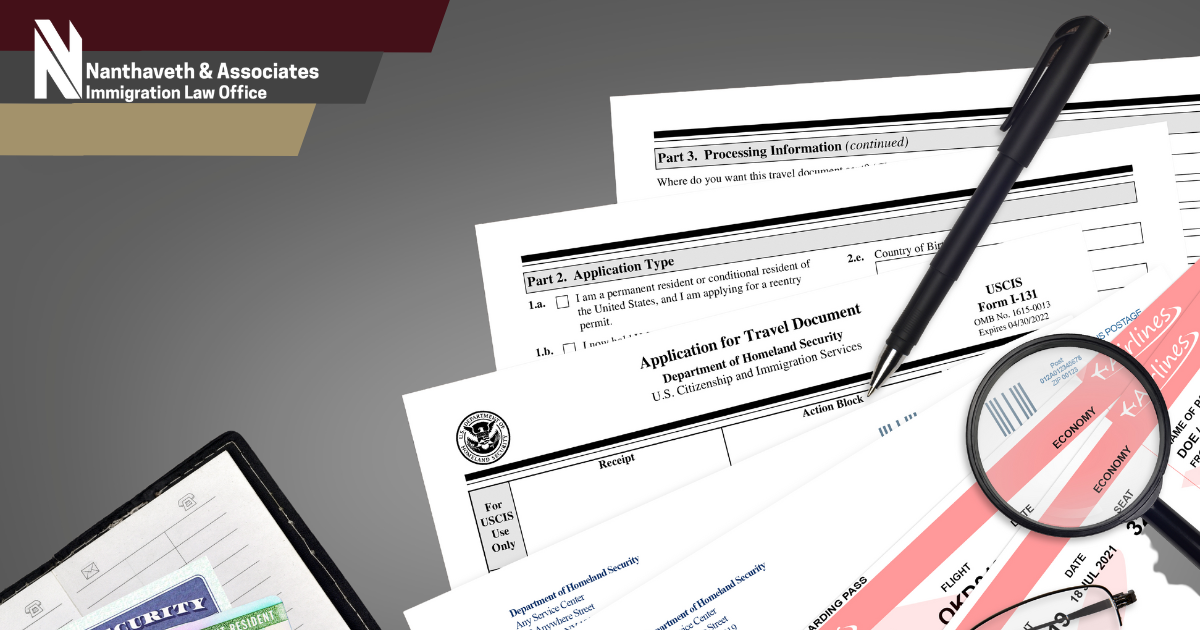Advance Parole Guide
Table Of Contents: Click To Learn More

If you want to live and work in the United States as a foreign citizen, you will need to apply for a permanent resident card, or green card.
This will allow you to live in America and find employment, as well as give you the opportunity to become a naturalized US citizen in the future.
But depending on your circumstances, it can take anywhere between ten months and several years for your green card application to be approved.
And if you are already living in America, one condition of your green card is that you cannot leave the US while the application is pending.
This is a long time without travel, especially if you have to wait three years for approval. What if you need to visit loved ones abroad or return home for a family emergency?
Fortunately, it is possible for non-US citizens to travel outside the US while waiting for their green card approval, as long as you apply for advance parole. The following article explains exactly what is meant by advance parole, and how you can apply for it. Read on to learn more.
What is Advance Parole?
Many immigrants who apply for green cards do so while already residing in the US with temporary immigration status. This may be under a tourist visa, student visa, or a spousal visa. In order to become a permanent resident, these individuals will have to apply for a green card under Adjustment of Status.
While your green card application is pending, you will be prohibited from leaving the United States. If you do, your green card application will be terminated and you will have to go through the entire process again. You may even be found inadmissible when attempting to reenter the country.
Advance parole is a travel document that allows you to travel while waiting for your green card approval. If you need to attend a business meeting abroad or a loved one’s funeral back home, you can do so as long as you have the physical travel document.
Who is Eligible for Advance Parole?
Anyone who meets the eligibility requirements for a permanent residence card, or green card, can apply for advance parole. Typically, there are no restrictions on the reasons an individual can choose to travel. Whether it is for academic purposes, business, or family matters, your document will allow you to leave the country for a fixed period, usually a maximum of one year.
However, there are some exceptions to this rule, and it is important to consult with an experienced immigration lawyer before applying for advance parole. For example, individuals who have overstayed their visa or entered the country illegally may face difficulties in obtaining advance parole. Additionally, those who have criminal records may also face challenges in obtaining this document.
You may apply for advance parole if you fall under one of the following categories:
- Adjustment of Status applicants with a pending green card application
- Those with Temporary Protected Status (TPS)
- Asylum seekers
- Those with a pending application for temporary resident status
- Those with T nonimmigrant or U nonimmigrant status
- Individuals granted humanitarian parole
- Individuals who have received benefits through the Family Unity Program
- DACA recipients
What If You Leave The Country Without Advance Parole?

Leaving the United States without advance parole can have significant consequences. It can result in the abandonment of your immigration application, loss of legal status, and even a bar from re-entering the country. Therefore, it is crucial to consult with an experienced immigration attorney before making any travel plans.
Your immigration attorney will be able to assess your situation and determine if you are eligible for advance parole or any other form of legal status that would allow you to leave the country without jeopardizing your immigration process. They can also advise you on the necessary documentation and procedures for obtaining advance parole.
When Should You Apply for Advance Parole?
You do not need a specific reason to obtain advance parole (except for DACA recipients), therefore, if eligible, we recommend applying for advance parole with your green card application. That way, you have the option to travel outside the U.S. if necessary.
If you are already in the process of adjusting your status but did not initially apply for advance parole, you may still be able to submit an application. However, it is important to note that the processing times for advance parole can vary, so it is best to apply as soon as possible if you have a need or desire to travel outside of the U.S.
It is best to consult with your immigration attorney before making any international travel plans. Your attorney can advise you on whether or not it is safe to leave and provide guidance on the appropriate time to apply for advance parole.
How are DACA Recipients Eligible For Advance Parole?
As a DACA recipient, you may be eligible to temporarily leave the United States with advance parole for educational, humanitarian, or work-related reasons. It is important to note that advance parole does not guarantee re-entry into the United States, but it may increase your chances of being allowed back in.
Due to the constantly changing nature of immigration policy, it is crucial to consult with a knowledgeable and experienced immigration attorney before applying for advance parole. They can guide you through the application process and ensure that all necessary documents are included and that leaving the U.S. temporarily is in your best interest.
How to Apply
An individual wishing to obtain advance parole can do so by completing and submitting Form I-131, otherwise known as Application for Travel Document. You can either do this as part of your original green card application, or at a subsequent time. You can access and complete the form on the USCIS website.
You will need to pay a $630 filing fee, as well as gathering various support documents to verify your identity and the authenticity of your application. These documents will include:
- Your official acknowledgement letter from your green card application
- Passport-style photographs
- A government-issued identification document
- Marriage certificate, if applicable
- Evidence for your reasons for travel. Although not essential, this can make it more likely that your application will be accepted.
Once the fees have been paid and the application submitted, you will need to wait for approval. Advance parole processing can take between three to five months.
If you need to travel urgently, perhaps for a family tragedy or to avoid financial loss, it may be possible to expedite your application and reduce the processing time down to 30 days. To obtain emergency advance parole, you will need to demonstrate to USCIS, with evidence, the urgency of your situation.
How Long Does Advance Parole Last?
The maximum period of time permitted for travel under advance parole is typically one year. An individual may leave and reenter the country multiple times during this period, as long as they return before the expiration date on the document. If green card approval is still pending after this time, they may submit another application for advance parole.
Be Prepared for Re-Entry
When traveling abroad with a pending green card application, you need to bring supporting evidence of your green card application and your advance parole. You should bring:
- A copy of your passport
- Your advance parole document (Form I-512)
- Employment Authorization Card (EAD)
- State ID or Driver's License
- Evidence of your current status (DACA, TPS, pending green card, etc)
- Evidence of your reason for travel (if applicable)

Does Advance Parole Guarantee Re-Entry?
It is important to understand that Advance Parole does not guarantee re-entry. While it provides an opportunity to travel outside the country without losing your immigration status or facing a bar from re-entry, the final decision rests with the Customs and Border Protection (CBP) officer.
If you have previously been undocumented or overstayed a visa, you should speak to an attorney before leaving the U.S., even with advance parole. You will likely be unable to re-enter the U.S.
If you are unsure about your eligibility for advance parole or have any concerns, it is best to consult with a knowledgeable and experienced immigration attorney who can guide you through the process.
Do You Need Help Obtaining Advance Parole?
If you are in the process of acquiring permanent resident status and wish to travel outside the US, applying for advance parole is your best option.
Nanthaveth & Associates has a team of experienced immigration attorneys who can help you navigate the application process and ensure that everything is in order for your international travel.
Contact us today for a consultation.

11211 Taylor Draper Lane Suite 107
Austin, TX 78759
Tel: (512) 828-3791
Hours: 8:00 AM - 6:00 PM
Payment: all major credit cards, cash, check, money orders, cashiers check
Directions To Our Office
Areas Of Service
Copyright © 2025 | Nanthaveth & Associates | Immigration Law Firm Marketing Specialist MarketCrest
Not all consultations are free, and they are not all conducted by Vi Nanthaveth.
